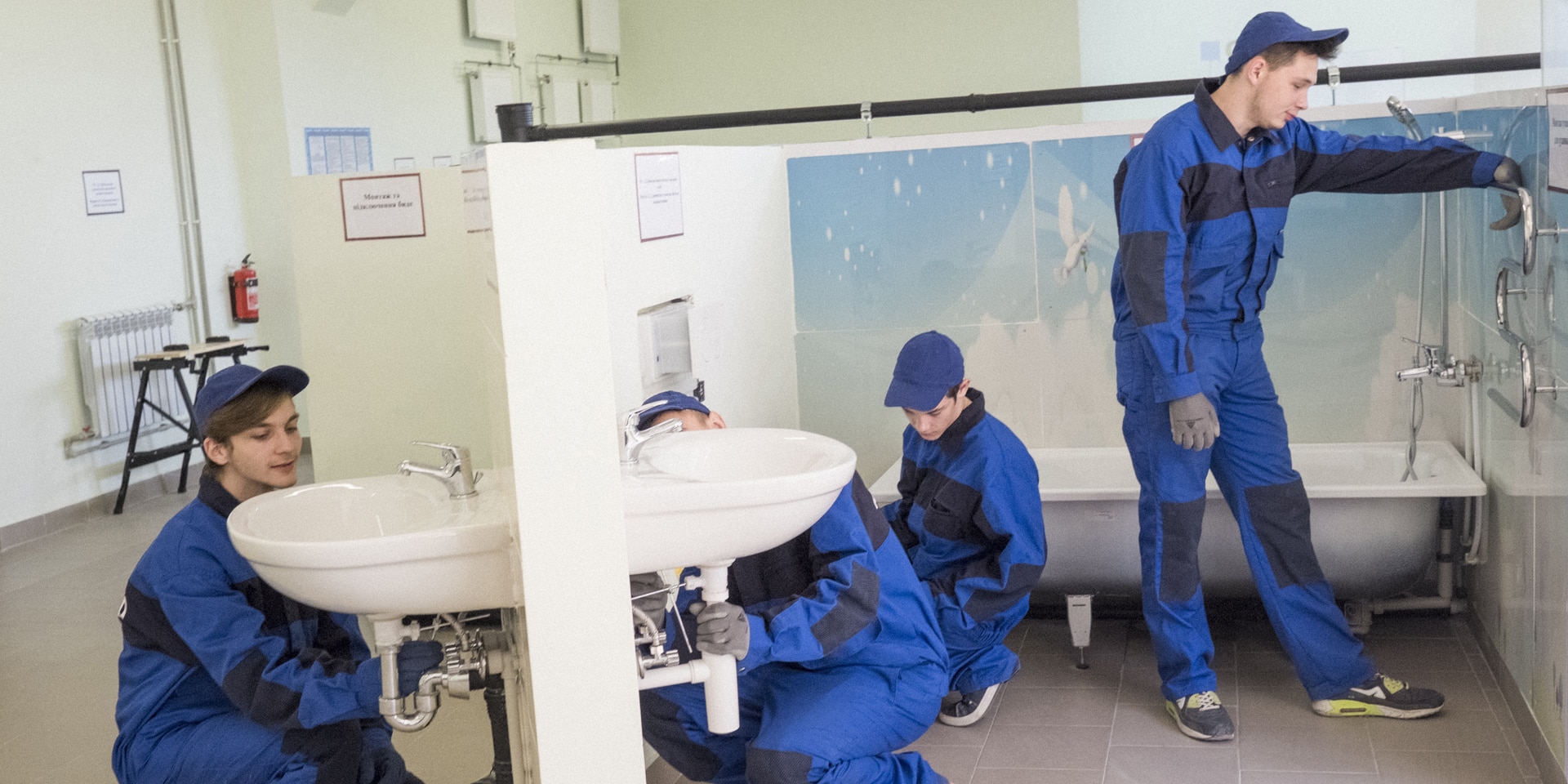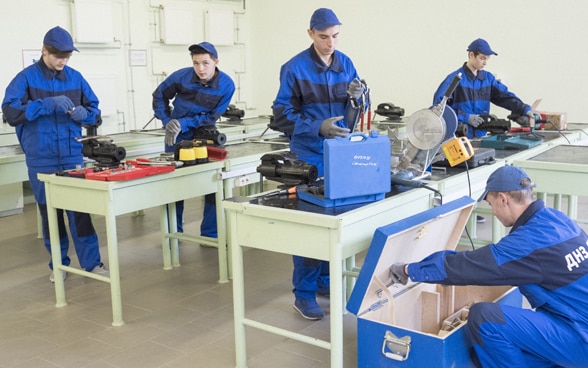Ukraine: economic prospects thanks to Swiss practice-based training
By supporting a new training programme for sanitary engineers, Swiss international cooperation is helping Ukraine switch from theory-based learning to a practice-based system. This gives young people job prospects in their own country. The public-private project underlines the importance of a holistic approach in international cooperation.

Practice-based training, more pay and social prestige: a good vocational education and training (VET) system gives young people more opportunities to build a future for themselves at home. © FDFA
Ukraine. A large country in between Europe and Russia. A large country in between high poverty and economic potential. To exploit the economic opportunities in its agricultural, industrial and service sectors over the long term, Ukraine needs young, dynamic workers who see a future for themselves at home.
But this is Ukraine's problem. Even though its growing private sector needs qualified workers, the country's VET system cannot keep pace.
"This means that even though the business sector is creating local jobs, there is a massive shortage of skilled workers. And that's in a country where a fifth of young people are unemployed," explains Nicole Ruder, head of International Cooperation in Ukraine. "Although the business sector wants to invest in the country long term, it faces major structural problems."
Practice-based training for 3,000 young people

The mismatch between the actual skills of Ukraine's labour force and the needs of its growing private sector is a key factor in the country's low productivity. The problem facing the Ukrainian government – making structural changes to the VET system to bring it closer to the needs of the labour market – requires an approach that Switzerland not only shares, but promotes all over the world. Together with the international Swisscontact, Swiss Foundation for Technical Cooperation and Swiss company Geberit, Switzerland is working to improve training in sanitary technology so that young sanitary engineers have better job prospects. Six vocational schools took part in a successful pilot in summer 2014, which has now been extended to all 25 regions thanks to the work of Ukrainian partners.
"The aim was to create a three-year training course for sanitary engineers that would be recognised by the Ministry of Education and is geared to the needs of the labour market," explains Ruder. In this way, by 2023 up to 3,000 young people will have completed a practice-based VET course enabling them to enter the labour market.
Swiss foundation acts as link with local partners
The public-private project between Swiss international cooperation, Swisscontact and Geberit underlines the importance of a holistic approach to international cooperation. "In this approach, each partner has its own strengths and brings something particular to the project", Ruder emphasises.
In this instance, Swiss international cooperation brings dual VET to Ukraine's policy agenda while Swisscontact fosters a cultural shift on the ground and acts as a link between the education system and the private sector. With the backing of the Ukrainian government's efforts and Swiss international cooperation, Swisscontact works closely with local technical institutions to encourage this switch from theory to practice-based training in a sustainable way.
Long-term commitment through matching funding
Such a project can only be deemed successful if it creates jobs and career prospects for young people in the local area. In Ukraine, Geberit's role as a bridge builder is to get local businesses on board.
"This is also about what we, as representatives of the private sector, can contribute to the success of a project: that's where international cooperation enables us to gain access to the right projects, which is really important because they aren't easy to find," explains Sidler.
For such projects, Switzerland prioritises the development of entire sectors; they are not intended to benefit individual companies alone. "When companies part-finance a project, matching funding from the private sector, it shows that they're interested in staying for the long haul," says Ruder.
Good pay and social prestige as incentives
Switzerland does not support any individual company directly. All three Swiss partners – government, foundation and company – pool their resources to achieve a jointly agreed goal.
Projects like these take time, mainly because they require social change. "Until now, being successful in Ukraine meant studying and working abroad. We want to help change this attitude with practice-based training and good jobs at home," explains Ruder.
More pay and social prestige should help reduce the pressure to emigrate and give young people better opportunities to build a future in their own country. This project not only benefits young Ukrainian sanitary engineers and their customers, but the whole of the country.
In its capacity as a bridge builder between Europe and Russia, Ukraine also plays a key international role. This means that sustainable economic development in Ukraine – the creation of well-paid local jobs and prospects for its young people – is in the interests of us all.
The project in brief
Public-Private Development Partnership to Improve Sanitary Education in Ukraine:
- Region: Ukraine
- Topic: VET, water
- Status: ongoing
- Duration:
Phase 1: 01.07.2014 – 31.07.20
Phase 2: 01.10.2018 – 28.02.2023 - Budget:
Phase 1: CHF 400,000
Phase 2: CHF 1,063,000 - Partner organisations: Swiss international cooperation, Swisscontact, Geberit
International cooperation
Swiss international cooperation is based on Switzerland's foreign policy strategy. It aims to combat poverty and contribute to sustainable development in developing countries via three main pillars – humanitarian aid, development cooperation, and the promotion of peace and security for affected people (International Cooperation Strategy 2021–2024).



